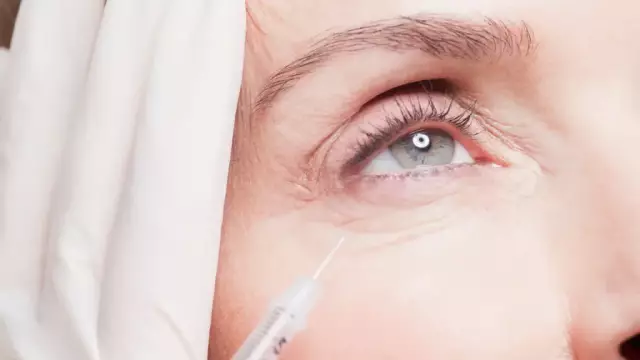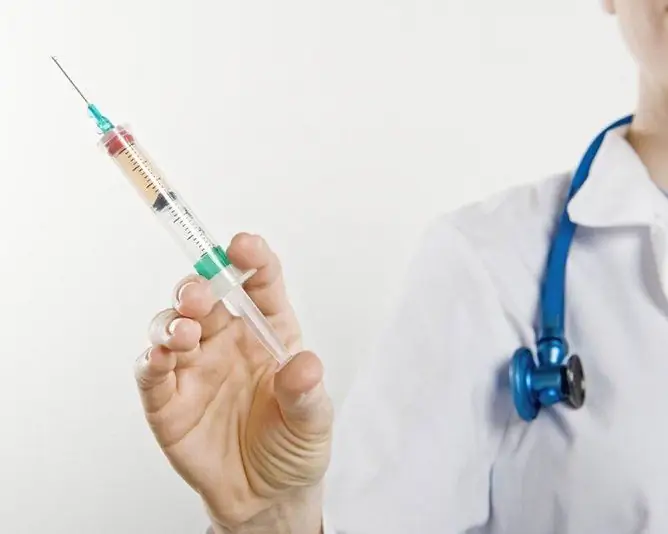- Author Rachel Wainwright wainwright@abchealthonline.com.
- Public 2023-12-15 07:39.
- Last modified 2025-11-02 20:14.
Ambene
Ambene: instructions for use and reviews
- 1. Release form and composition
- 2. Pharmacological properties
- 3. Indications for use
- 4. Contraindications
- 5. Method of application and dosage
- 6. Side effects
- 7. Overdose
- 8. Special instructions
- 9. Application during pregnancy and lactation
- 10. Use in childhood
- 11. In case of impaired renal function
- 12. For violations of liver function
- 13. Use in the elderly
- 14. Drug interactions
- 15. Analogs
- 16. Terms and conditions of storage
- 17. Terms of dispensing from pharmacies
- 18. Reviews
- 19. Price in pharmacies
Latin name: Ambene
ATX code: M01BA01
Active ingredient: solution A - dexamethasone (Dexamethasone), lidocaine hydrochloride (Lidocaine Hydrochloride), sodium hydroxide (Sodium Hydroxide), phenylbutazone (Phenylbutazone), sodium salicylamide acetate (Sodium Acetate Salicylamide); solution B - cyanocobalamin (Cyanocobalamin), lidocaine hydrochloride (Lidocaine Hydrochloride)
Producer: Merckle GmbH (Germany)
Description and photo update: 2019-26-08
Prices in pharmacies: from 1065 rubles.
Buy

Ambene is a complex anti-inflammatory, analgesic and antipyretic agent.
Release form and composition
Dosage form - solution for intramuscular administration in double ampoules (3 or 5 sets on a plastic tray, 1 tray in a cardboard box) or two-chamber syringes with a needle, a napkin and a plaster (3 or 9 pcs. On a plastic tray, 1 tray in a cardboard box) … Each pack also contains instructions for the use of Ambene.
Composition of solution A (2 ml):
- active ingredients: phenylbutazone - 375 mg; sodium salicylamide acetate - 150 mg; lidocaine hydrochloride - 4 mg; dexamethasone - 3.32 mg;
- auxiliary components: sodium hydroxide - 49.08 mg; water for injection - 1675.92 mg.
Composition of solution B (1 ml):
- active ingredients: cyanocobalamin - 2.5 mg; lidocaine hydrochloride - 2 mg;
- auxiliary component: water for injection - 996.5 mg.
Pharmacological properties
Pharmacodynamics
Ambene is a combined agent, the pharmacological action of which is due to the properties of its constituent components. It has analgesic, anti-inflammatory and antipyretic activity, and has a uricosuric effect.
Solution components A:
- phenylbutazone (a pyrazolone derivative) is a non-steroidal anti-inflammatory drug (NSAID) with analgesic, antipyretic and uricosuric effects;
- sodium salicylamide acetate - an analgesic agent that also contributes to better solubility of the drug;
- lidocaine hydrochloride - anesthetic;
- dexamethasone is a glucocorticoid with a pronounced anti-inflammatory effect, practically without mineralocorticoid activity.
Cyanocobalamin (vitamin B 12), which is part of the B solution, is present in the synthesis of nucleic acids, activates lipid metabolism, participates in cell regeneration and the formation of the myelin layer of nerve fibers. As part of the drug, it enhances the analgesic effect.
Ambene's active substances enhance each other's action, which makes it possible to reduce the dose of dexamethasone.
Pharmacokinetics
After intramuscular administration, dexamethasone quickly enters the systemic circulation.
Phenylbutazone is characterized by a high degree of binding to plasma proteins. Slowly metabolized, providing a long half-life.
Phenylbutazone and dexamethasone cross the placenta and are excreted in breast milk.
The half-life of dexamethasone is approximately 3 hours.
Indications for use
- Articular syndrome;
- Neuralgia;
- Rheumatoid arthritis;
- Gout;
- Neuritis;
- Radiculitis;
- Osteoarthritis;
- Ankylosing spondylitis and other degenerative diseases of the spine.
Contraindications
Ambene is contraindicated in the following pathologies:
- Gastrointestinal ulcer;
- Gastritis in the acute stage;
- Acute heart attack;
- Chronic heart failure of the second and third degree;
- Diseases of the myocardium with conduction disorders;
- Thyroid pathologies;
- Viral infections;
- Systemic mycosis;
- Corneal trauma;
- Glaucoma;
- Diseases of the blood and bone marrow;
- Myasthenia gravis;
- Myopathies;
- Hemorrhagic diathesis;
- Porphyrias;
- Pancreatitis;
- Lymphadenitis caused by vaccination with BCG;
- Stomatitis;
- Hypersensitivity to drug components.
Ambene is contraindicated in women during pregnancy and lactation, in children under 14 years of age and in elderly patients.
Ambene, instructions for use: method and dosage
Ambene injections are prescribed 1 time per day, every day or every other day, no more than 3 per week. It is necessary to take a break of 2-3 weeks between courses of treatment.
The drug is used as follows: solutions from 2 ampoules (solution A and solution B) are mixed in one syringe and injected deeply intramuscularly, slowly, the patient should be in a horizontal position during the injection. It is necessary to ensure that the temperature of the injected drug is not lower than the patient's body temperature.
Rules for preparing a solution for injection when using a ready-made syringe:
- Remove the rubber cap from the conical part of the syringe.
- Remove the protective element from the sterile needle and install it on the syringe body.
- Slowly move the piston rod with plug forward until the first drop of solution appears.
If the preparation technique is followed, solution B enters the syringe chamber through the connecting bridge and mixes with solution A. It is necessary to prepare the solution immediately before administration.
Side effects
Ambene's use can cause:
- Convulsions;
- Headache;
- Psychosis;
- Euphoria;
- Dizziness;
- Sleep disturbance;
- Dysfunction of the kidneys, liver, hearing, vision;
- Excitation;
- Anuria;
- Vomiting, abdominal pain, diarrhea, loss of appetite;
- Erosive damage and bleeding from the gastrointestinal tract.
Also, when using Ambene, aplastic anemia, pancytopenia, agranulocytosis, bradycardia, orthostatic collapse may develop, pressure may decrease, allergies, fever, fungus, pulmonary and cerebral edema may appear, in rare cases, the patient may fall into a coma. Pain, inflammation, or tissue necrosis is sometimes observed at the injection site.
For the treatment of severe adverse reactions that developed after the use of Ambene, artificial ventilation of the lungs, hemodialysis, and other resuscitation measures are performed. If necessary, diazepam should be administered intravenously.
Overdose
Symptoms: abdominal pain, nausea, vomiting, gastrointestinal bleeding, metabolic alkalosis or acidosis, headache, dizziness, fever, elevated transaminase levels, hepatic and renal failure, anuria, aplastic anemia, leukopenia, thrombocytopenia, arterial agranulocytosis hypotension, cardiac decompensation, respiratory depression, hyperventilation, cerebral and lung edema, convulsions, coma.
Overdose treatment is symptomatic. If necessary, artificial lung ventilation and other resuscitation measures are carried out. For seizures, anticonvulsants (such as IV diazepam) are prescribed. To accelerate the elimination of Ambene, hemodialysis is performed.
special instructions
It is recommended to use the agent with caution when:
- Tuberculosis;
- Bacterial infection;
- Bronchial asthma;
- Amoebiasis;
- Epilepsy;
- Mental disorders;
- High and low pressure;
- Hay fever;
- Osteoporosis;
- Thromboembolism.
In order to avoid the development of side effects in weakened patients, if possible, the drug should be prescribed in the minimum dose.
Before starting therapy, it is recommended to exclude the presence of gastric ulcer and 12 duodenal ulcer.
During treatment, doctors advise eating food containing potassium, proteins and vitamins, excluding or reducing the intake of table salt, carbohydrates and fats.
With long-term treatment, it is necessary to monitor the peripheral blood picture, liver and kidney function. Patients receiving anticoagulants require monitoring of the parameters of the blood coagulation system.
Ambene injections should be canceled in case of changes in the skin and mucous membranes, headache or fever, development of agranulocytosis or leukopenia, staining of feces in a dark color.
If it is necessary to conduct a study of the function of the thyroid gland, analyzes should be carried out at least 2 weeks after Ambene's cancellation.
It should be borne in mind that the drug can distort clinical and laboratory parameters in patients with pernicious anemia and funicular myelosis.
Application during pregnancy and lactation
Ambene is prohibited for use during pregnancy.
If treatment is required during lactation, consideration should be given to stopping breastfeeding.
Pediatric use
Ambene is contraindicated in children under 14 years of age.
With impaired renal function
The drug should not be used in case of renal failure.
For violations of liver function
The drug should not be used for liver failure.
Use in the elderly
Ambene is contraindicated in elderly patients. If it is necessary to use it in old age, the drug should be prescribed in a minimum dose to avoid the development of side effects.
Drug interactions
During treatment, it should be borne in mind that the combination of Ambene with ethyl alcohol, as well as other anti-inflammatory drugs, increases the risk of bleeding in the gastrointestinal tract.
Hypoglycemia and hyperglycemia can develop with the simultaneous administration of the drug with antidiabetic oral drugs.
In addition, the agent increases the toxicity of methotrexate, phenytoin, enhances the effect of hypnotics, reduces the effectiveness of antihypertensive and hormonal contraceptives, sulfinpyrazone, probenecid.
Ambene's action is reduced by barbiturates, hydantoin, promethazine, rifampicin and other drugs-inducers of microsomal liver enzymes, and strengthened by methylphenidate and anabolic steroids.
If Ambene is prescribed to a patient receiving indirect anticoagulants, heparin, sulfinpyrazone or dipyridamole, it is necessary to monitor the prothrombin time. Dose adjustments may be required.
Ambene can increase the plasma concentration of lithium preparations and sulfonamides.
In the case of the use of cardiac glycosides, Ambene can speed up or slow down the digitalization of patients.
With the simultaneous use of diuretics, it is possible to develop hyper- or hypokalemia, a decrease in diuresis and natriuresis.
Ambene should not be used within 8 weeks before and 2 weeks after routine vaccination, since the drug can reduce or even completely eliminate its effectiveness.
Analogs
Ambene's analogs are Dexamethasone, Movalis, Milgamma, Neurobion, etc., it is possible to inject Lidocaine simultaneously with drugs.
Terms and conditions of storage
Store in a dry, protected from direct sunlight at a temperature not exceeding 25 ° C.
The shelf life is 3 years.
Terms of dispensing from pharmacies
Dispensed by prescription.
Reviews about Amben
Reviews about Amben are mostly positive. Patients consider it an effective fast-acting remedy that relieves pain and relieves inflammation, practically does not cause side effects, provided the recommended dosage regimen is observed.
The disadvantages of the drug, many refer to its high cost, a large list of contraindications, as well as its lack of free sale (Ambene is sold in online pharmacies and from official suppliers from Germany).
Price for Amben in pharmacies
The price for Amben is approximately 600-800 rubles. for 1 ampoule.
Ambene: prices in online pharmacies
|
Drug name Price Pharmacy |
|
Ambene bio solution for in. amp. 1ml 10 pcs. 1065 RUB Buy |
|
Ambene Bio injection solution 1 ml 10 pcs. 1065 RUB Buy |

Anna Kozlova Medical journalist About the author
Education: Rostov State Medical University, specialty "General Medicine".
Information about the drug is generalized, provided for informational purposes only and does not replace the official instructions. Self-medication is hazardous to health!






